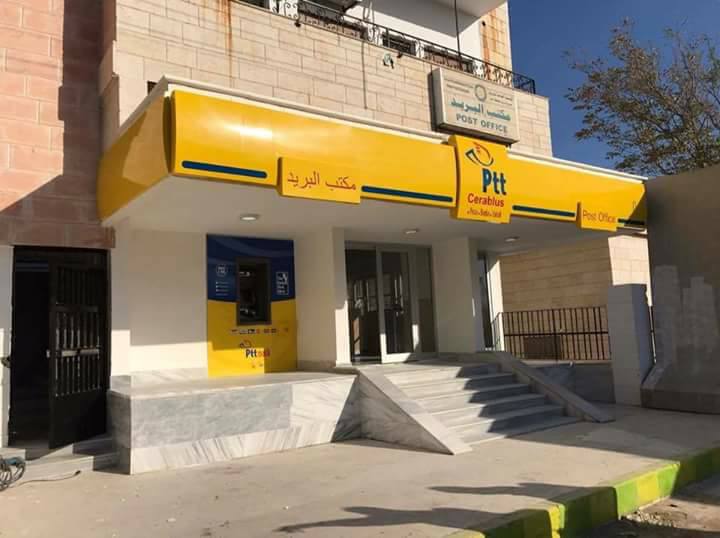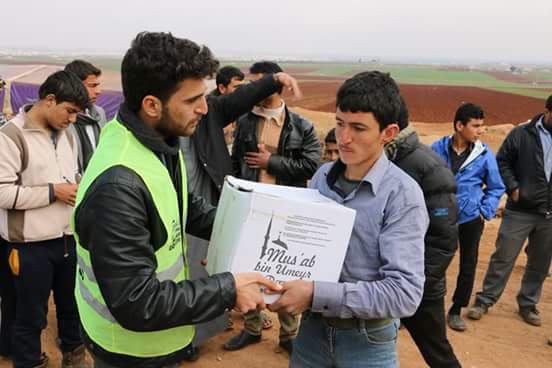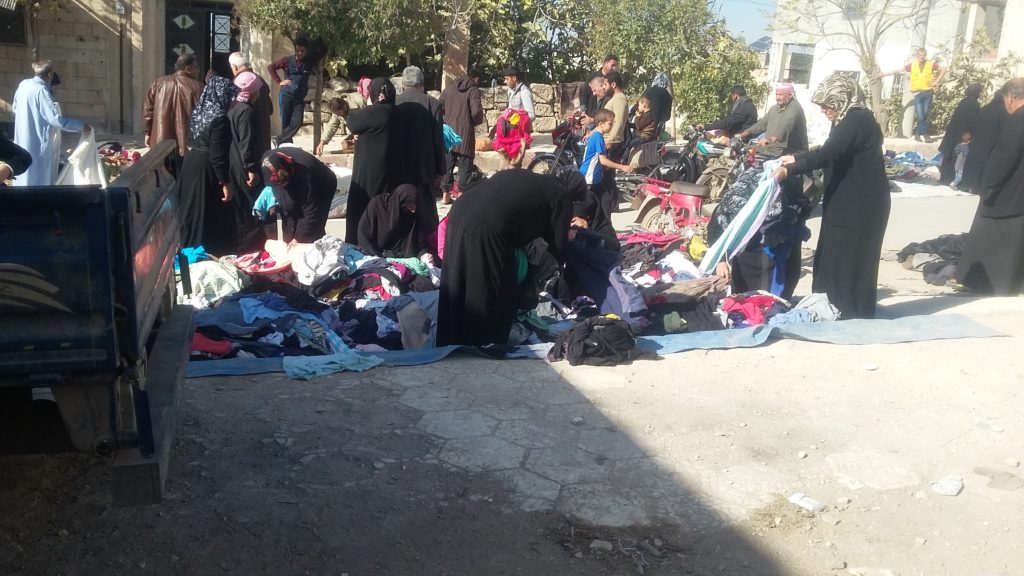(Idlib) Despite being military par excellence, Turkish presence has been widely welcomed by different segments of Syrian society in Idlib countryside and the Euphrates Shield areas, north of Aleppo. The reason for that being its contribution to improving the living condition of these areas, for the first time since the outbreak of the uprising in 2011.
Turkish Organizations on Syrian Territory
Significantly, in the midst of geopolitical complexities and multiple foreign interventions, a prominent Turkish government organization has recently opened a new branch on Syrian soil. In the city of Jarablus, in the northern countryside of Aleppo, and under the auspices of the Turkish-backed Euphrates Shield rebel groups, the Post and Telegraph Organization (PTT) branch was inaugurated on October 11, 2017. It has been up and running with transfers and postal orders being sent to and from various parts of Turkey ever since.
A member of Jarablus local council, Ahmed Mahli, said that the branch has noticeably lifted the postal burdens placed upon Syrian citizens, providing banking, shipping, billing and postal services for the people of the area.
Trader Omar Al-Hasan (40) further explained to SyriaUntold the advantages of the newly opened branch. “We suffered a lot from intermediaries costing us fortunes to facilitate our work between Syria and Turkey, especially in terms of transferring considerable amounts of cash and huge shipments from and to Turkey. It’s much easier and smoother now that we cooperate with PTT’s post office, which has saved us much time and effort.” On November 22, 2017, another PTT branch was inaugurated in Al-Bab, the largest city in the Aleppo countryside.

In addition to the PTT, the Turkish Mus’ab bin Umeyr Charity Association has been increasingly active in the Idlib countryside, providing relief assistance to displaced and poor families. Additionally, the Turkish NGO Humanitarian Relief Foundation [İHH, designated as “terrorist” by several European states since its participation in the Gaza Freedom Flotilla in 2009] has opened a completely free charity market that includes dozens of shops. “Clothes, food, furniture, medicines and utensils are distributed to the families of martyrs and detainees,” explained Muhammad At-Taqsh (35), the project manager.
Turkish organizations have been even part of the medical sector in Syria, since the Turkish Ministry of Health established a hospital in Jarablus named after the city.

Besides the government organizations, other consumer goods, food, textile, building materials and automotive products have been on top of Turkish exports to Syria, according to Turkish Foreign Trade statistics. As economist Khaled Al-Halabi (45) explained to SyriaUntold, “the Syrian society has been suffering from suffocating economic crises that forced it to adapt to reality and search for new sources of commodities. This is especially the case in the liberated areas, where people looked to Turkey, a neighboring state with borders controlled by the Free Syrian Army [FSA]. Demand on Turkish goods increased to meet Syrian local needs, and popular markets emerged thereafter.”
Al-Halabi noted that more than 25 popular markets have been opened in the larger governorate of Idlib, which established the presence of not only Turkey’s goods but also its currency. As the Syrian Pound is often affected by the appreciation of the Turkish Lira (TRY), especially with the constant collapse of the former, northern markets became battlegrounds “between the two liras,” as Al-Halabi put it.
Umm Muhammad (50) has converted all her savings to TRY, as have many in the north of Syria, whether inhabitants or traders. Every 1 lira is nowadays equivalent to 140 SYP. Locals often cite the continuous collapse of the Syrian Pound, which amounts to massive loss of value. “I chose the Turkish currency because it’s more stable and is widely circulated in the local market, and because it has coins unlike the US dollar.”
Some of the Turkish goods are available in Idlib markets at lower prices than in Turkey itself. However, traders opt to raise their prices to make greater profits, taking advantage of the absence of supervisory authorities and people’s unawareness of original prices. This is particularly evident in the business of non-essential goods, where traders often invoke the collapse of the Syrian Pound and the rise of the Turkish Lira to justify their maneuvers.
Abu Salim (38), a vendor of secondhand clothes in Maarrat An-Nu‘man, identified three reasons for his interest in selling Turkish clothes exclusively: “For they’re more in demand by Syrian customers, they’re higher in quality, and they’re cheaper than Syrian clothes.”
Moreover, the delivery of new or used goods from regime-controlled areas has been beset by restrictions and obstacles. According to trader Adnan[i], “Regime checkpoints often commandeer large quantities of goods to extort money, which contributes to their exorbitant prices if ever recovered. This is why people in the liberated areas became uninterested in these goods in favor of Turkish secondhand clothes.”
To Adnan, Turkish used clothes are a much more viable and convenient option. “I go to the border area of Sarmada and buy them from dealers in kilos and sell them to my customers on retails. I make excellent profits.”

Turkish goods are not limited to opposition-controlled areas. Goods imported via the northern borders are widely abundant in the Syrian coastal areas.
Despite the communiqué of the Syrian Council of Ministers prohibiting government sectors from importing Turkish goods on September 18, 2014, the “private sector” of smugglers have exempted themselves from the decision, including smuggler Husam Al-Qirumi[ii] who supports the regime. Al-Qirumi believes that the Syrian economy is already exhausted, and that its “inevitable” collapse will not stop if he stops importing Turkish goods, which are his sole source of livelihood. He has brought various Turkish goods to regime-controlled areas, specifically Latakia, and has made profits that he described as “decent.”
Al-Qirumi enjoys “good” relations with those in charge of checkpoints, which do not only help him bring his own goods into the regime territories, but also make him broker deals with other traders who need to reach the port of Latakia to export their goods. As explained by Ramez Hallaq[iii] (40), who collects fig harvests from the opposition areas every year and exports them to Egypt with Al-Qirumi’s help. “Al-Qirumi is known for his extensive ties in the regime-controlled areas, possibly by virtue of briberies. Thanks to him and his likes, our goods reach their destinations safely and without troubles. Even though we’re obliged to pay considerable amounts of money to Al-Qirumi, he still makes it a lot easier for us.”
Relatedly, in August 2015, the Turkish Ministry of Trade and Customs decided to let in Syrian goods (mainly cotton, wheat and olives) to Turkey provided that they are not produced in areas controlled by the regime, the An-Nusra Front (which controls vast areas of Idlib governorate by dominating an alliance called Hay’at Tahrir al-Sham, HTS) or the self-declared Islamic State (IS). The Turkish Ministry only accepts goods whose certificates of origin are issued by the opposition-led Syrian Interim Government and stamped with its official seals.
Increased Demand for Turkish Language
As learning Turkish became a priority for many Syrians, Turkish language institutes have spread across the areas of Idlib.
Alaa Al-Khatib (35), director of the Ru’ya Language Center in Kafranbel, described the demand for Turkish as “high,” both by males and females, especially that the center offers language courses for free. It has thus far graduated four classes since its establishment in 2014. Al-Khatib emphasized that they have “enhanced the skills of […] trainees,” admitting that their certification is not recognized in Turkey or other countries. “We also have a shortage of competent teachers,” he complained.
Syrians undertake Turkish language training for a host of reasons. including their desire to pursue higher education in Turkey – Syrian higher education in the opposition-controlled areas suffers from both regime warplanes and the lack of international accreditation. On the other hand, many Syrians seek to migrate for job opportunities in Turkey, given the decline of job markets in their regions. Additionally, many are driven by pure linguistic curiosity.
A manager of a mosaic painting company in the countryside of Idlib, Fuad Ad-Dani (50) decided to open a new branch in Turkey and will need to learn Turkish for business purposes. He embarked on studying the language along with a number of his employees who will be relocated to the Turkish branch.
According to Turkish teacher Ahmed Murad, there are more than five language institutes operating in Idlib and countryside. Murad estimates the number of their students to range between 1,000 and 1,500.
Never have Syrians thought of welcoming the Turks back in their country [after the collapse of the Ottoman Empire], but they remain arguably the least of the evils awaiting the people of the region. What remains unanswered is, should Turkish influence grow stronger in Idlib and the larger Syrian north, would that be a violation of Syrian sovereignty whereby Turkey softly invades the “safe zones” economically, financially and socially? Or would it rather contribute to the recovery of the area after years of bombardment, besiegement and destruction?
[Main image: A drawing on the Turkish role in northern Syria (Comic4Syria/SyriaUntold)].
[i] A pseudonym was used for security reasons.
[ii] Idem.
[iii] Idem.




